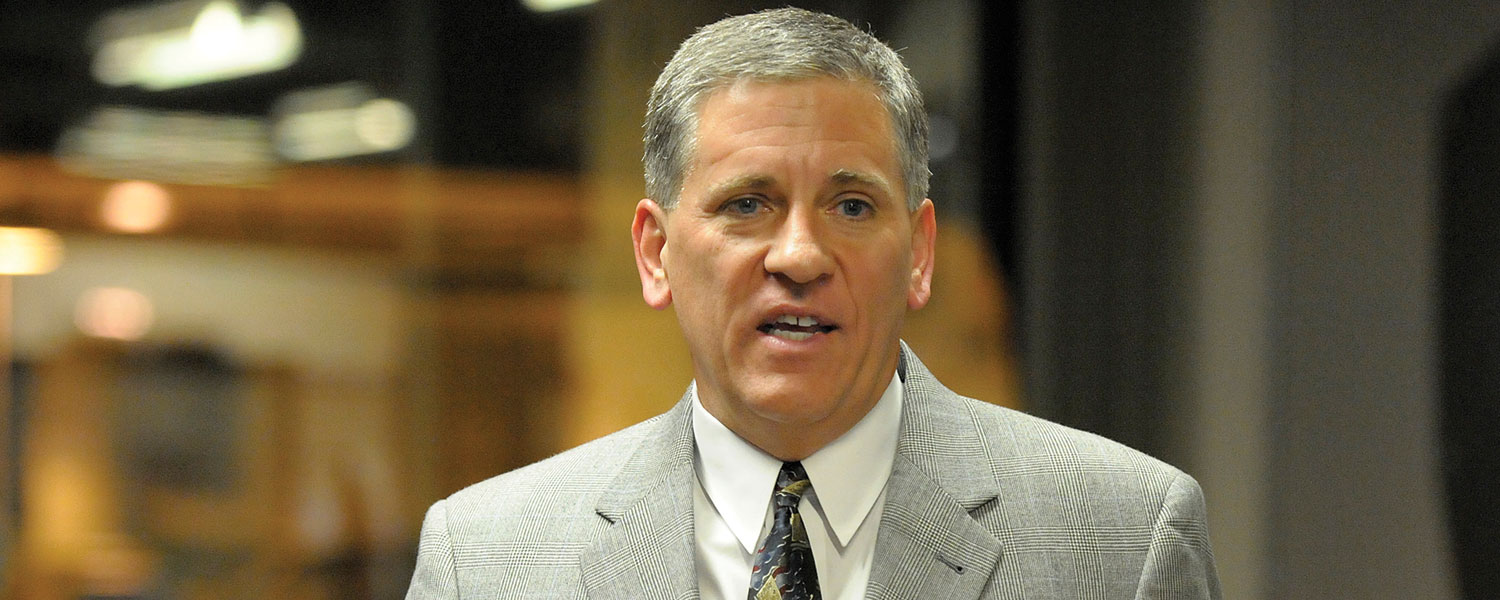Parallax
Can Government Intervention End Obesity?
Interview by Robyn Kontra

For decades, Americans have heard about a growing epidemic of obesity across the nation. It’s an issue tied to food consumption, public health and government spending — but should the government have a role in addressing it? We asked two Cal Poly faculty members — a professor of economics and a professor of marketing — to discuss their very different perspectives on this question.
Michael Marlow, Ph.D., is a professor of economics with research focusing on the economic effects of government spending, taxation and regulatory policy. He has published more than 75 articles in research journals including Applied Economics, Review of Economics and Statistics, and the Journal of American Physicians and Surgeons. He has also written about public policy for news outlets including The Wall Street Journal, The New York Times and The Economist.
Brennan Davis, Ph.D., is an associate professor of marketing, specializing in connecting large datasets with questions about market research. He has been published in the Journal of Public Policy & Marketing (JPP&M) and the Journal of Business Research. His article in the American Journal of Public Health won the 2009 Best Paper Award from the Robert Wood Johnson Foundation, and one of his articles in JPP&M won the 2014 Kinnear/JPP&M Award from the American Marketing Association.
CAL POLY MAGAZINE: Do you think there’s a role for government in ending the obesity epidemic?
DAVIS: First of all, I think that the majority of the citizens of the United States have shown that they want government to play a role in their health, voting in a way that’s consistent with a desire for some form of intervention. Besides that, the government is spending between $150 and $200 billion each year on medical costs related to obesity, and I do think it’s acceptable that the government would try to do something to reduce those costs. I think the only debate is what that role should be.
MARLOW: There’s no doubt that obesity prevalence has risen over time, but despite decades of research, we’re no closer to a solution as to what has caused it. I think there are only two roles for government in this issue: providing basic data that can help us understand the problem, and regulating faulty and fraudulent claims about weight loss. One study found that 65 percent of all weight loss ads contained some form of misinformation. Markets and businesses can help consumers who want to lose weight, but government can help clear out some of the nonsense.
Dr. Marlow, what is the role of economists in this issue?
MARLOW: We examine data to try to determine why we have a problem, how large that problem is, and when it started. Economists tend to believe that the falling price of food is a big factor — as food becomes cheaper, people eat more of it. In a classical, rational economic approach, the only way to reduce overconsumption is to increase the price through taxes or to institute bans on certain foods — essentially penalizing consumers.
Dr. Davis, how does the marketing field contribute?
DAVIS: A lot of what we look at in marketing is consumer psychology. We look at how a product is packaged and advertised, what information is available about a product, how easily available it is in the consumer’s surroundings, and how all those factors affect consumer behavior. Then we take that information and give it to policymakers who can do something about it — really just trying to figure out how we can help the government understand the problem better. If we can help develop ways to nudge consumers toward health behaviors, we can set them up for success while they still make their own decisions.
Do you think that government can ever really understand this problem?
MARLOW: I think that there’s a natural disadvantage in the government doing the things that Brennan is talking about. When a company tries to introduce those things to help consumers lose weight and that product doesn’t work, they either change it or get rid of it. But when government does that, there’s no profit motive. No one’s job is on the line. So they tend to try to enforce what they think should work without finding out whether it does.
Taxes are one example. When we’ve tried to discourage soda or tobacco consumption by adding taxes, consumers who really love those products might cut back consumption a little, but nowhere near what the government would expect. It’s the same with labeling requirements. When fast food consumers can see menus with calorie counts, that doesn’t affect cash register sales overall. It could be that we need to design our nudges better, but I’m sort of skeptical.
DAVIS: I have a different perspective, and it has to do with the science that does go into that policy advice. The experiments that we as researchers do, if done right, actually do provide a lot of insight about what’s happening in the real world. One researcher I’ve worked with, the former head of the U.S. Department of Agriculture’s Center for Nutrition Policy and Promotion, was able to scientifically show that environmental factors in a restaurant contribute to how much food customers eat. Empirical evidence shows moderate to strong evidence that marketing variables, like advertising and product placement, have an impact on what children choose to eat. And there’s a body of evidence that shows that anti-smoking marketing messages were successful over much of the same period that the obesity epidemic was growing.
Food is a complicated issue, and consumers don’t behave as a collective group. Everyone is an individual and will act differently. Government has a role in this because someone needs to be advocating for those consumers, making businesses that sell food consider their actions beyond just the profit factor.
MARLOW: I think that what Brennan is saying is that the good intentions are extremely important here, but the evidence that any of these interventions have had long-term effects is very, very disappointing. Over 90 percent of people who lose significant weight regain it within, I believe, four to five years. And so we get yo-yo dieting, and it can be quite detrimental to your health. Research has shown that there are weight loss myths perpetuated in society despite evidence to suggest they aren’t effective. One is that small, sustained changes in diet or exercise produce large, long-term weight changes. There are also presumptions, ideas that persist in the absence of supporting scientific evidence, like that snacking contributes to weight gain and obesity. There is no long-term medical evidence on any of that. But I think we’ve all heard these things over and over.
I believe that some of these good intentions, especially incremental nudges from government regulations, cater to the myths and sometimes the presumptions about weight loss. So we’re perhaps fooling ourselves. And there’s this kind of natural tendency, especially when government is involved, to ramp up programs based on these assumptions.
DAVIS: I haven’t seen any marketing studies that are trying to promote any of the myths that you put forward. I don’t think that there’s an agenda to put forth false information. There are consequences that we never expected, and certainly we want to tackle those as well. I think one of my recent papers makes the case for approaching this problem differently by branding food as nurturance over nutrients.
Do you think there is a motive for businesses to brand or market themselves with self-regulating tactics without government forcing them to do it? Is it cool to be ahead of the curve?
DAVIS: I actually think that food companies are trying to be more cooperative compared with tobacco companies historically, and many welcome these changes. They want to make money, but if they can make money and have healthy customers, it only benefits them in the long term.
What role do you think technology can play in better informing the consumers or controlling misinformation about health?
MARLOW: I think that there is a great trend with mobile apps. There are thousands of these health, fitness and medical apps. This gives us some information on what people are doing, especially with exercise, which I think is one of these things that’s invisible in much of the debate. Not only is the consumer getting information for their own use, but businesses are using this information as well. And this is being energized through the private sector. There’s research that suggests that these apps are encroaching upon the traditional weight loss firms like Weight Watchers and Jenny Craig. These businesses are either going to have to change what they do or go out of business. And that’s why I would rather have the business sector do this, where there is a market test.
DAVIS: I think that it’s a wonderful avenue. More information in this wonderful new world of analytics is a positive step.
Is there something promising in your field that’s the next frontier in solving this issue?
MARLOW: I think marrying the science with the social science is key, so if we do design interventions or businesses design products, they need to be based on real science rather than myths and presumptions.
DAVIS: What Michael mentioned about the role of technology was really astute. I could see certain messages or other experimental variables that would help us gain insights. More data in the real world is probably going to be the answer to solving this problem because it’s so complex.





